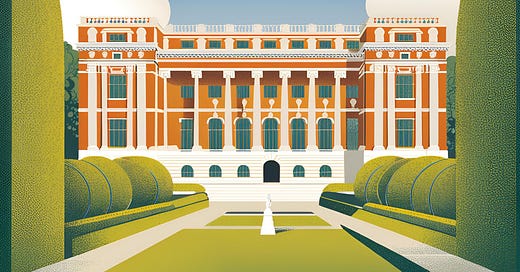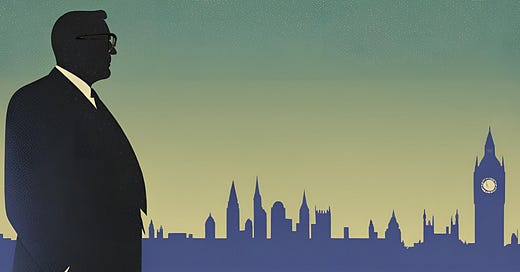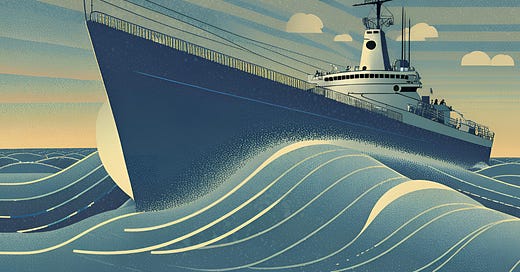
Welcome to the 32nd Cable, our weekly roundup of British foreign and defence policy.
It’s safe to say it has been a mixed week for the European attempts to charm Donald Trump, President of the United States (US). It started with Kaja Kallas, High Representative of the European Union (EU) for Foreign Affairs and Security Policy, being snubbed by Marco Rubio, Secretary of State of the US, during her visit to Washington early last week. Emmanuel Macron had better luck, but Sir Keir Starmer, Prime Minister, enjoyed the warmest reception from the new American administration. Softening Trump with an invitation from King Charles III for a state visit and what appeared to be a genuine warmth between the two leaders, Sir Keir came away from the meeting with several wins. The United Kingdom (UK) appears to have escaped from US tariffs (for now), while Trump gave soft approval for the deal to hand over the British Indian Ocean Territory (BIOT) to Mauritius, with both men discussing the deep historic ties between their two countries.
However, the disastrous and explosive meeting between Trump and Volodymyr Zelenskyy, President of Ukraine, on Friday has upended any sense of progress, with the future of the transatlantic relationship once again called into question. As a result, His Majesty’s (HM) Government has stepped into the breach by taking the lead in enhancing European security.
Welcome back to The Cable!
Calling London
In the wake of the disastrous meeting between Trump and Zelenskyy, the first serious crisis summit was held at Lancaster House in London on 2nd March, which saw the leaders of Ukraine and 17 other countries, including key European nations – Finland, France, Poland and Turkey – as well as key figures from the North Atlantic Treaty Organisation (NATO) and the EU, come together to discuss the future of Euro-Atlantic security.
Charing the summit, Sir Keir highlighted the seriousness of the occasion stating ‘Now is the time for us to unite in order to guarantee the best outcome for Ukraine, protect European security, and secure our collective future’. To achieve this, the talks focused on how Europe will support Ukraine, provide strong security guarantees for Kyiv, and secure a lasting peace to end the conflict. However, while the Prime Minister admitted that Europe would have to do the ‘heavy lifting’, he stressed that the transatlantic relationship with America remains key to European security.
The summit ended with some concrete future steps, with those gathered agreeing upon a four-point plan – heavily influenced by the Finns – yet the details remain vague. What is clear, though, is that in the absence of American leadership, Britain will be central to the future of European security. The recent announcement to increase defence spending to 2.5% of Gross Domestic Product (GDP), increased material support to Ukraine in the form of loans (see below) and the stable majority Labour enjoys in Parliament places the UK in a strong position to grab the reins and lead a coalition of the willing to resist Russian aggression.
Key diplomacy
HM Government marked the third anniversary of Russia’s full-scale invasion of Ukraine by announcing over 100 new sanctions against organisations and individuals from both Russia and North Korea. For the first time, sanctions have been placed on financial institutions supporting the Russian war effort, including the Kyrgyzstan-based OJSC Keremet Bank.
HM Government has rebuked several countries for their actions in the last week:
HM Government has demanded that the Rwandan Government cease its support for the M23 rebel group in Eastern Democratic Republic of Congo, who are continuing their military campaign, and commit to the African led peace processes to end the conflict. Until these conditions are met, London has announced that it will cease attending events hosted by the Rwandan Government and has suspended most forms of aid to the African nation.
David Lammy, Foreign Secretary, released a statement criticising the Thai Government for deporting 40 Uyghurs, who had fled Xinjiang, back to the People’s Republic of China (PRC).
The UK, Canada, Iceland and Norway published a joint-statement to the Organisation for Security and Cooperation in Europe (OSCE) reiterating their non-recognition of the legitimacy of the Georgian presidential elections held in February.
Catherine West, Under-Secretary of State (Indo-Pacific), hosted Amarsaikhan Sainbuyan, Deputy Prime Minister of Mongolia, for the first annual political dialogue under the UK-Mongolia Joint Cooperation Roadmap towards a Comprehensive Partnership. The talks focused on enhancing bilateral cooperation on economic growth, climate action, democratic governance and investment in Mongolia’s significant critical mineral deposits.
Defence
On 25th February, David Lammy, Foreign Secretary, released a written statement defending HM Government’s decision to cut the Official Development Assistance (ODA) budget to increase defence spending. Highlighting the worsening geopolitical environment, Russia’s ongoing invasion of Ukraine and the US’ growing focus on the Indo-Pacific, Lammy stated that Britain should ‘...act as a pillar of security on our continent – in a world plagued by more active conflicts than at any time since the Second World War.’
On 27th February, the Ministry of Defence (MOD) released its annual statistics on the British Armed Forces. As of 1st April 2024, the UK had: ten submarines and 70 surface vessels, 3,316 pieces of combat equipment, 32 regular army battalions and 16 reserve battalions, 556 fixed-wing and 268 rotary-wing aircraft.
Following last week’s announcement of increased defence spending, the MOD has published new measures to support the over 12,000 Small and Medium Enterprises (SMEs) which work within the defence sector. These measures will include SME spending targets for the MOD and launching a new hub to provide SMEs with better access to the defence supply chain.
At the emergency European security summit in London on Sunday, HM Government announced a contract worth £1.6 billion had been signed with Thales to supply Ukraine with 5,000 lightweight multirole missiles (LMMs). The contract will be funded via a loan underwritten by UK Export Finance (UKEF) following an agreement in 2024 to allow Ukraine to draw on £3.5 billion worth of support from UKEF to spend with UK industry.
Environment and climate
Delegates in Rome at the United Nations (UN) biodiversity conference – known as COP16 – have signed an agreement which will see countries around the world spend US$200 billion (£157.5 billion) a year by 2030 to protect nature and the environment. This follows the COP15 in 2022, which led to the international agreement to protect 30% of land and oceans by 2030.
The Climate Change Committee (CCC) has published its advice for the UK’s seventh climate budget, which states that electrification is the key to decarbonising the British economy and that for the UK to hit Net Zero by 2050, 80% of road vehicles will need to be electric and 40% of households will require heat pumps by 2040. The CCC also stated that the costs of reaching Net Zero have declined by 73% compared to their advice for the sixth climate budget made in 2020. According to their new analysis, the net cost of the energy transition will be around £4 billion per year out to 2050, or less than 0.2% of GDP.
How Britain is seen overseas
The Lowly Institute in Australia published an article analysing the implications for Australia of Britain’s cut to ODA. While Britain’s ODA spending in the Indo-Pacific is small, the author points out that British Indo-Pacific programmes are the most likely to face cuts. And with Australia’s already small ODA budget, Canberra will face a choice of whether to take up the slack or follow the Euro-Atlantic in de-prioritising the delivery of aid.
The Egmont Institute in Belgium published an article analysing the extraordinary events of the last week, both in Washington and London. The author looks favourably on the British initiatives:
It is heartening to see how when the stability of the European continent itself is threatened, Britain reverts to its traditional strategic role and steps up to forge the coalition that can preserve the balance of power. As a Belgian, it reminds me that my country’s truest ally, at independence and from the very start in two world wars, has not been the US, but the United Kingdom.
ERR in Estonia stresses the hurt Estonia and the other Baltic states – Latvia and Lithuania – felt at being excluded from the London Summit on Sunday. While Sir Keir held online meetings with the three nations’ leaders, the report cites Marko Mihkelson, Chair of Estonia’s Foreign Affairs Committee, who says that their exclusion ‘optically it is not very good.’
How competitors frame Britain
Tass released propaganda claiming that Britain is trying to undermine what it calls ‘peace talks’ between Moscow and Washington. Calling Britain, France and Germany the ‘anti-Trump bloc’ the piece states that ‘London always feels much more comfortable where there is a divide between Russia and the US’. It concludes by claiming that Russia will ‘raise’ Britain’s destructive role at various international venues and institutions. Typical nonsense from the Kremlin’s mouthpieces.
A spokesperson for the Chinese Embassy to the UK issued a statement following HM Government’s criticism of the Thai Government sending 40 Uighurs back to the PRC. The spokesperson stated that by ‘hyping an already infamous lie on Xinjiang, the UK is trying to discredit China’s policy in Xinjiang and point fingers at normal law enforcement cooperation between China and Thailand… It is nothing but despicable political manipulation.’ Once again, Beijing is showing its contempt for international law as it oppresses minorities within its borders.
How Britain thinks about foreign affairs
Sir Keir has announced that international aid spending will be reduced to 0.3% of gross national income (GNI) from 2027 in order to increase investment in defence.
The British public is supportive of this decision, with some two-thirds indicating they approve of this move. But it has also attracted criticism from some quarters – such as from Gen. Lord Richard Dannatt, former Chief of the General Staff. He argued that ‘cutting aid to fund [the increase in defence spending] is a fundamental strategic error that risks making us weaker, not stronger’.
Across the UK there are four distinct, if overlapping, groups or ‘tribes’ on international aid.
For compassionate humanitarians, aid is a moral imperative. They view international aid as an ethical obligation and an important part of global citizenship, which extends beyond national borders. Their philosophy is well captured by the words of the poet John Donne: ‘Any man's death diminishes me, because I am involved in mankind’. As such, they are strong supporters of the international aid budget and reaching the UN 0.7% aid target, if not increasing it further. They are also supportive of a separate Department for International Development (DfID). Some within this group may be critical of aid, arguing that it is in need of ‘decolonisation’ and should place greater emphasis on local agency, but they still believe that aid is a moral responsibility.
Pragmatic realists are also supportive of the aid budget, but they believe that aid should be aligned with national interests – such as aiding counter-terrorism, curbing migration, and boosting domestic economic growth. Some within this group may favour an independent development department, but broadly they are supportive of the merger between DFID and the Foreign and Commonwealth Office (FCO) to create the Foreign, Commonwealth, and Development Office (FCDO).
Aid-effectiveness sceptics advocate for ‘trade not aid’ because they believe that development comes primarily through commerce. They are sceptical about the efficacy of aid and its ability to create sustainable development because they are concerned about the unintended consequences of aid, such as hampering institutional capacity building, creating dependency, and leading to corruption. While they oppose aid programmes, they are likely to support emergency disaster relief.
Finally, ‘charity-begins-at-home’ champions believe that there is a zero-sum game between international aid and domestic spending. That is, aid is a diversion of resources from pressing domestic needs, and so every pound spent abroad is a pound that should instead have been spent within the UK. Some believe that Britain can improve the world more effectively through its technology and economic gravity, as well as its commitment to liberal democracy and international security. This group believes that charity should begin at home, and that the government should focus on addressing the UK’s own social and economic challenges before sending resources abroad.
In recent decades, these different tribes have wrestled for influence over Britain’s international aid policy. However, it appears as though the pragmatic realists are now in the driving seat.
This section is named after Gould Francis Leckie, author of An Historical Survey of the Foreign Affairs of Great Britain (1810) – the first modern geopolitical text.
If you found this Cable useful, please subscribe or pledge your support!
What do you think about this Cable? Why not leave a comment below?
















